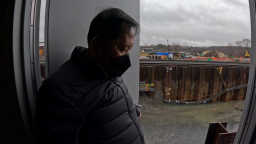The Environmental Protection Agency and the Department of Justice have reached a $310 million settlement agreement with Norfolk Southern after last year’s train derailment that spilled more than a million pounds of hazardous chemicals into the soil, water and air in Ohio.
“If the settlement is approved by the U.S. District Court for the Northern District of Ohio, Norfolk Southern will be required to take measures to improve rail safety, pay for health monitoring and mental health services for the surrounding communities, fund long-term environmental monitoring, pay a $15 million civil penalty, and take other actions to protect nearby waterways and drinking water resources,” the EPA said Thursday.
The?February 2023?derailment ignited a dayslong inferno, spewed poisonous fumes into the air,?killed thousands of fish?and left residents wondering if it’s safe to live in East Palestine.
In the weeks following the disaster, officials said tests showed the air quality and municipal water were safe. But some residents reported a variety of health problems after the derailment, including rashes, nausea, bloody noses and trouble breathing.
Thursday’s announcement stems from a civil lawsuit filed in March 2023. The DOJ sued Norfolk Southern on behalf of the EPA, alleging violations of the Clean Water Act from the discharge of pollutants and hazardous materials into waters.
Norfolk Southern issued a statement Thursday saying it has reached an agreement with the DOJ, the EPA and the US Department of the Interior “to resolve all their claims and investigations arising from the derailment in East Palestine, Ohio.”
The agreement, which is subject to court approval, “builds on the significant financial commitments that the company has already made,” Norfolk Southern said.
In fact, Norfolk Southern said the costs associated with the agreement “have either been previously estimated … or are included as part of the company’s ongoing financial outlook.”
When asked whether the $15 million civil penalty is enough, EPA Administrator Michael Regan told reporters Norfolk Southern is “going above and beyond and actually doing things they had not planned to do,” and “so I think it is a strong step forward.”
What Norfolk Southern must do
Under the settlement, the EPA said, Norfolk Southern has agreed to:
? Spend an estimated $235 million for past and future costs to help ensure the company – not taxpayers – is on the hook for all cleanup costs
? Pay a $15 million civil penalty to resolve the alleged violations of the Clean Water Act
? Pay $25 million for a 20-year community health program that includes medical monitoring for qualified individuals, mental health services for those living in affected counties as well as first responders who worked at the site, and a community facilitation plan to help community members in using the benefits of the program
? Spend about $15 million to implement long-term monitoring of groundwater and surface water for a period of 10 years
? Pay $15 million for a private drinking water monitoring fund that will continue the existing private drinking water well monitoring program for 10 years
? Implement a “waterways remediation plan,” with an estimated budget of $6 million, for projects in Leslie Run and Sulphur Run that will prioritize addressing historical pollution, reduce non-point source pollution through infrastructure upgrades and stormwater management projects, and restore aquatic and riparian habitat
? Pay $175,000 for natural resource damages to restore, rehabilitate, replace, or acquire the equivalent of the natural resources injured as a result of the derailment
? Undertake projects to improve the safety of transporting hazardous materials by rail, including the installation of “additional devices to detect overheated wheel bearings early enough to prevent derailments like the one that happened in East Palestine,” the EPA said.
Company reaches $600M agreement for residents
In addition to the federal civil lawsuit, Norfolk Southern has reached a tentative, $600 million settlement agreement that would resolve all lawsuits covering thousands of residents within 20 miles of the site of the derailment.
The agreement, which needs final approval from a judge, would also resolve personal injury claims within a 10-mile radius from the derailment, Norfolk Southern said last month.
“Individuals and businesses will be able to use compensation from the settlement in any manner they see fit to address potential adverse impacts from the derailment,” the company said. “This could include healthcare needs and medical monitoring, property restoration and diminution, and compensation for any net business loss.”
But the settlement agreement does not “constitute any admission of liability, wrongdoing, or fault,” Norfolk Southern said.
This week, a judge gave preliminary approval for that settlement agreement. Now, lawyers for the plaintiffs will meet residents in the coming weeks to answer questions about the settlement and how residents can submit claims for compensation.
Residents and businesses within 20 miles of the derailment should expect to hear from Kroll Settlement Administration, a third party hired to execute the paymentsr. Residents and businesses that want to file a claim must do so by August 22.
A hearing for final approval of the settlement is scheduled for September 25.
What caused the disaster, and what’s next?
The National Transportation Safety Board has been investigating the cause of the derailment and has posted hundreds of pages of reports, interview transcripts and other information related to the probe.
So far, the investigation has focused on a failing, flaming wheel bearing. A preliminary NTSB report said sensors detected a wheel bearing heating up miles before it eventually failed and caused the train to derail. But the detectors didn’t alert the crew until it was too late.
NTSB board members will return to East Palestine next month to hold a public meeting and vote on the final findings, probable cause and recommendations.
“We’re not just going to focus on the immediate wheel bearing issue” at the June 25 meeting, NTSB?Chairwoman Jennifer Homendy told CNN in February.
“We’re going to look at hazmat impacts to the community,” she said. “We’re going to make safety-critical recommendations to make sure communities don’t have to live through that again.”
This story has been updated with additional information.
CNN’s David Goldman, Jason Carroll, Ross Levitt, Gabe Cohen, Pete Muntean, Gregory Wallace, Ella Nilsen, Alisha Ebrahimji and Andi Babineau contributed to this report.






